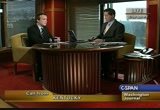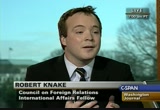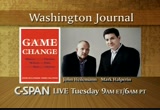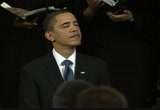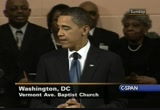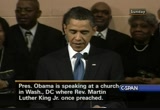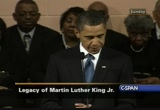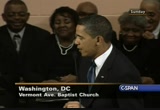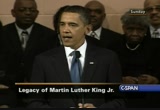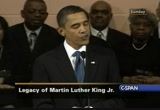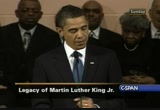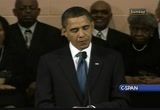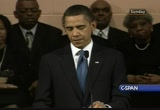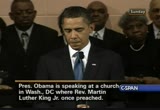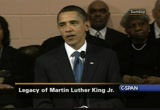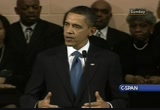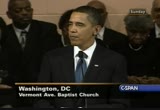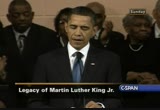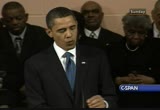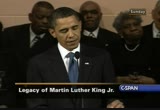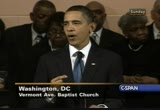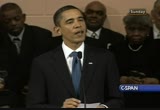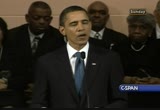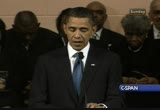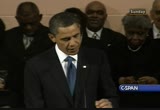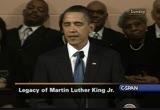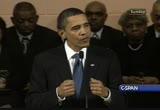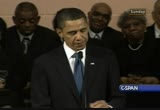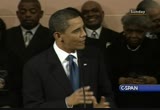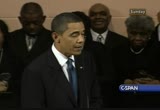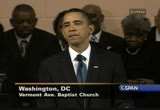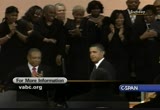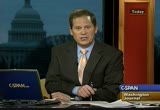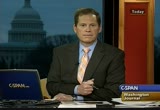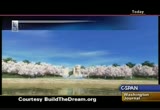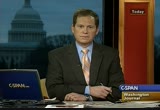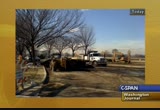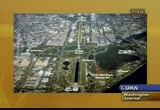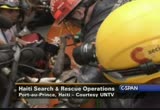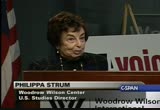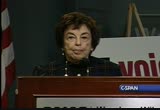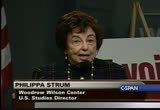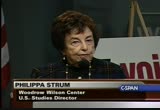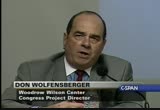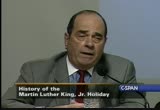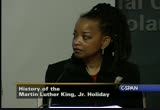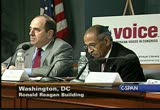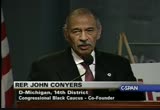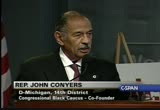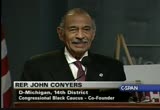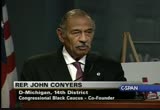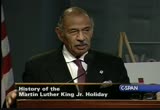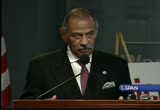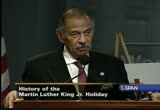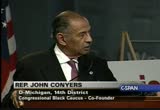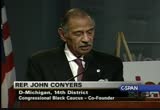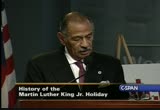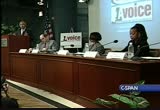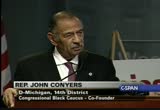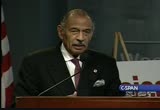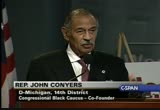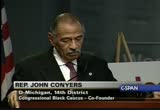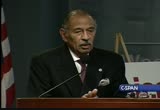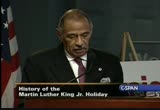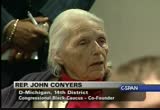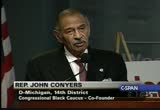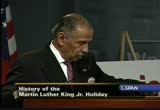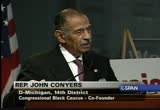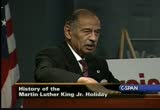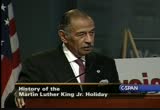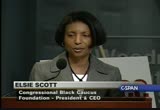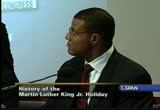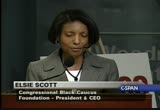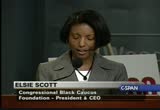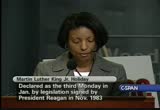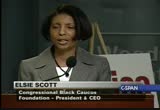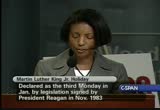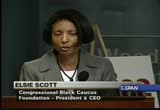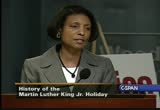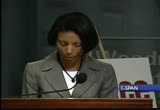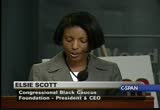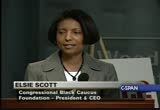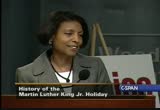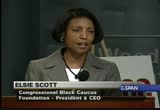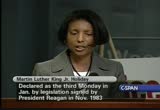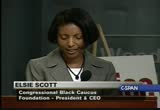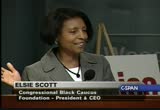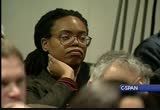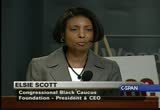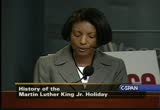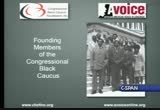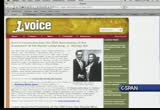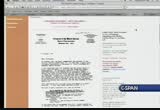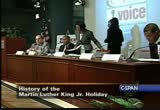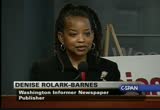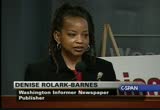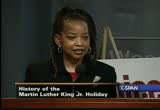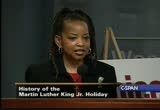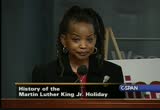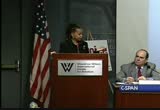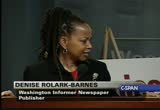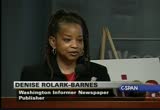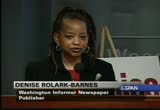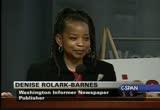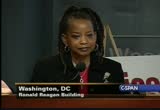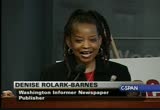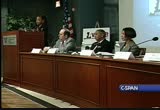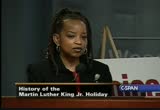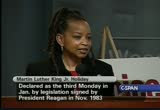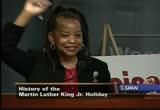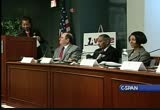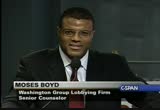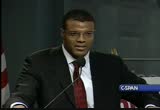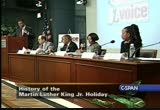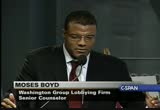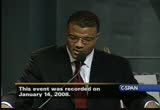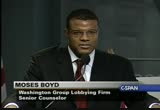tv Today in Washington CSPAN January 18, 2010 10:00am-12:00pm EST
10:00 am
but moving to china was the only way he could make money. i am behind google if they pull out of china just to make a statement. they are a communist country, they are known for piracy, and i think it is high time that companies not tolerate that totalitarianism even over the american companies. host: any final thoughts? guest: i think in the coming weeks we will see the issue played out more. i am not sure we will learn a lot more about what happened to google or the other companies but i think we will see the chinese response or take some action either to block google.cn completely or restrict the search terms in other ways and then we will probably see the state department respond
10:01 am
with a strategy that is really going to give, hopefully, people living in these kinds of regimes, access to a free and unfettered internet. host: robert knake from the council on foreign relations, thank you. that will do it from -- for this morning's " washington journal." back tomorrow morning at 7:00 a.m. eastern. enjoy the rest of this martin luther king holiday. . [captioning performed by national captioning institute] [captions copyright national cable satellite corp. 2010] .
10:02 am
>> president barack obama talks about dr. king and his legacy and an update on the martin luther king memorial. we'll also look to the establishment of mlk day. coming up later today, live coverage of new virginia governor bob mcdonnell in his first state of the commonwealth address. we will begin at 7:00 p.m. eastern here on c-span. ).zñtonight, larry cohen, the hd of the communications workers of america and what the federal government's role should be an expanding communication in the communication that is on c-span 2. now president barack obama on the legacy of martin luther king
10:03 am
jr. he commemorated the birthday of the late civil rights leader yesterday. president barack obama spoke at the historic thurmont avenue baptist church in the nation's capital where dr. king once preached. his remarks are about half an hour. [applause] >> good morning. praise be to god. let me begin by thanking the entire of vermont avenue baptist church family for welcoming our family here today. it feels like a family. thank you for making us feel that way. [applause] to pastor wheeler, first lady
10:04 am
wheeler, thank you for welcoming us today. congratulations to jordan denice aka cornelius. [laughter] michelle and i have been blessed with a new nephew this year. austin lucas robinson. maybe at the appropriate time we can make introductions. [laughter] if jordan's father is like me, that will be about 30 years. [laughter] that is a great blessing. michelle and melia and sasha and i are thrilled to be here today.
10:05 am
i know that sometimes you have to go through a little falls to have me as a guest speaker. [laughter] let me apologize in advance. for all the fuss. we gathered here on a sabbath, during a time of profound difficulty for our nation and for our world. in such a time, its suits the sole to seek out the divide. ne. it is a community of believers. we are not here just to ask the lord for his blessing. we are not here just to interpret. his interpret we are also here to call on the memory of one of his noble
10:06 am
servants. the rev. dr. martin luther king jr. it is fitting that we do so here within the four walls of vermont avenue baptist church. here, in a church that rose like the phoenix from the ashes of the civil war, here in a church formed by freed slaves whose founding pastor had warned the union blue, here in a church whose pews, congregants set out for marches and from home choir and forms of freedom were hurt and whose sanctuary, killing himself, was sermonized from time to time. one of those times was thursday, december 6, 1956. pastor, you said you were older than me, were you a round at that point? [laughter]
10:07 am
your three years old. [laughter] i was not born yet. [laughter] on thursday, december 6, 1956, and before dr. king had board and thus to the mountaintop and told about his treatment of the lincoln memorial, king came here as a 27-year-old preacher to speak on what he called the challenge of a new age. it was a. tramp -- it was a period of triumph. weeks earlier, the supreme court had ordered the desegregation of montgomery's buses. a hard-fought battle that would put an end to the 381-day historic boycott devin montgomery, alabama.
10:08 am
and yet, as dr. king wrote to take the pulpit, the future cell -- still seemed daunting. it was not clear what would come next for the movement that dr. king lead. it was not clear how we were going to reach the promised land. segregation was still rife, lynchings still a fact. the supreme court had ruled not only on the montgomery bus is but also on brown vs. board of education and yet, that ruling was defied throughout the south. by schools and by state. they ignored it with impunity. here, in the nation's capital, the federal government had yet to fully allied itself with all laws on its books and the ideals of its founding. it is not hard for us, then, to imagine that moment. we can imagine folks coming to
10:09 am
this church, happy about the boycott being over, we can also imagines them coming here concerned about their future. sometimes the second guest strategies, may be fighting off some creeping doubts. perhaps despaired about whether the movement in which they had placed so many of their hopes, a movement which they believed so deeply could actually deliver on its promise. here we are, more than half a century later, once again facing the challenges of a new age. here we are, once more, marching toward an unknown future, what i call the joshua generation, like the moses generation, the great inheritors of progress pay for with sweat and blood and sometimes life itself. we have inherited the progress
10:10 am
of unjust laws that are now overturned. we take for granted the progress of a ballot being available to anybody who wants to take the time to actually vote. we enjoy the fruits of prejudice and bigotry being lifted slowly, sometimes in fits and starts, but irrevocably, from human hearts. it is the progress that might possible for me to be here today, for the good people of this country that elected me, an african-american as the 44th president of the united states of america. rev. wheeler mentioned the inauguration. on the heels of that victory over one year ago, some suggested that somehow we had entered into a post-racial america. all those problems would be solved.
10:11 am
there are those who argued that because i had spoke of a need for unity in this country that our nation was somehow entering into a period of post- partisanship. that did not work out so well. there was a hope shared by many that life would be better from the moment that i swore that oath. of course, as we meet here today, one year later, we know the promise of that moment has not yet been fully fulfilled. because of an era of greed and irresponsibility that sowed the seeds of its own demise, because of persistent economic troubles unaddressed through the generations, because of the banking crisis that has brought the financial system to the brink of catastrophe, we are being tested in our own lives and as a nation as you have been
10:12 am
tested before. unemployment is at its highest level in more than a quarter of a century, and nowhere is it higher than the african-american community. poverty is on the rise. ownership is slipping. beyond our shores, our sons and daughters are fighting two wars. closer to home, our haitian brothers and sisters are in desperate need, bruised, battered, many people are legitimately feeling doubt, even despair about the future. like those who came to this church on that thursday in 1956, folks are wondering," where do we go from here?" i understand those feelings. i understand the frustration and sometimes anger that so many folks feel as they struggle to stay afloat.
10:13 am
i get letters from folks around the country every day. i read temper night out of the 40,000 receive. paris -- they are stories of hardship and desperation, in some cases, pleading for help, they needed jobs, they might lose their home, they don't have health care, their family might be bankrupt. some time to get letters from children. a mama or daddy has lost their jobs, is there something we can do to help. 10 letters like that the day we read. we're passing through a hard winter. it is the artist in some time. -- it is the hardest in some time. let us always remember that as a people, the american people, we have weathered some hard winters before. this country was founded during
10:14 am
some harsh winters. the fishermen, laborers, the craftsman who made camp at bally's board, they weathered a hard winter. the slaves and the freed men who rose through the underground railroad, is seeking the light of justice under the cover of night, they weathered a hard winter. this interest whose speech was tired, the pastor whose voice echoes through the ages, they weathered some hard winters. it was for them as it is for us, difficult in the dead of winter to sometimes see spring coming. they, too, sometimes felt their hopes deflate and yet each season, the frost melts, the cold war recedes, the sun reappears. so it was for earlier generations and so it will be for us. what we need to do is to ask what lessons we can learn from
10:15 am
those earlier generations about how they sustain themselves during those hard winters. , how they persevered and prevail. but let us in this joshua generation learn how that moses generation overcame. let me offer a few thoughts on this. first and foremost, they did so by remain firm and a result. despite being threatened by sniper fire or planted bombs, by shoving and punching and spitting or angry stairs, they adhered to the sweet spirit of resistance. the principles of nonviolence that had accounted for their success. second, they understood that as much as our government and our political parties had betrayed them in the past, as much as our nation itself had betrayed its own ideals, government, if a line with the interests of its people can be and must be a
10:16 am
force for good. they stayed on the justice department. they went into the courts. they pressure congress. they pressured their president. they did not give up. on this country. they did not give up on government. some say that government was the problem they set the record to change the government and make it better. perfect as it was, they continued to believe in the promise of democracy, and america's constant ability to remake itself, to perfect this union. third, our predecessors were never so consumed with theoretical debates that they could not see progress when it came. sometimes, like a little frustrating when folks don't want to see that even if we don't get everything, we're getting something. [applause]
10:17 am
king understood that the desegregation of the armed forces did not end the civil rights movement because blacks and white soldiers still could not sit together at the same lunch counter when they came home. he still insisted on the rightness of desegregated the armed forces. that was a good first step. even as he called for more, he did not suggest that somehow by the signing of the civil rights act that somehow all discrimination would end but also did not think that we should not signed the civil rights act because it does not solve every problem. let's take a victory, he said, and keep on marching. forward steps, large and small were recognized for what they were. this was progress. fourth, the core of his success was an appeal to conscious that touched hearts and open the minds, a commitment to universal ideals, freedom,
10:18 am
justice, the quality that spoke to all people, not just some people. king understood that without broad support, any movement for civil rights could not be sustained. that is what he marched with the white autoworker in detroit. he linked arms with the mexican farm workers in california. he united people of all colors in the noble quest for freedom. of course, king overcame in other ways as well. he remained strategically focused on gaining ground. his eyes were on the price cost of like an understanding that change would not be easy, understanding that change would not come overnight, understanding there would be setbacks, false starts along the way of understanding, as he said, in 1956, that we can walk and never get weary because we know that the great camp meeting in the promised land of freedom and justice. and it's because the moses
10:19 am
generation overcame and the trials we face today are very different from the ones that test of us in previous generations. even after the worst recession in generations, like america is not even close to being as brutal as it was back then for so many. that is the legacy of dr. king and his movement. that is our inheritance. having said that, let there be no doubt, the challenges of our new age are serious in their own right. we must face them as clearly as they face the challenges they sought. i know it has been a hard road we traveled this year to rescue the economy but the economy is growing again. the job losses have finally slowed and around the country, there are signs that businesses and families are beginning to rebound.
10:20 am
we're making progress. i know it has been a hard road that we travel to reach this point on health reform. i promise you, i know. [laughter] under the legislation i will sign into law, insurance companies will not be able to drop the when you get sick and more than 30 million people, our fellow americans, will finally have insurance, more than 30 million men, women, and children, mothers and fathers [laughter] [applause] won't be worried what might happen to them when they get sick. this will be a victory, not for democrats, this will be a victory for dignity and decency, for our common humanity. it will be a victory for the united states of america. let's work to change the political system, as imperfect as it is. i know people can feel down about the way things are going sometimes here in washington.
10:21 am
i noticed something to give up on the political process but we put in tupper rules on laws and lobbying and tougher than any administration in history. is not enough but it is progress. progress is possible. don't give up on biodegrade don't give up on abacus a very delicate up on activism. there are too many needs to be met. too much work to be done. like dr. king said, we must accept finite disappointment but never lose infinite hope. let us broaden our coalition, building a confederation, not of liberals or conservatives, not red states or blue states, but of all americans who are hurting today. they are searching for a better tomorrow. the urgency of the our demands that we make common cause with all of america's workers, white, black, brown, all of whom are being hammered by this recession.
10:22 am
all of whom are yearning for that. spring to that it demands that we reach out to those who have been left out in the cold, even when the economy is good. even when we are not in recession. the youth in the inner-city, the utah and washington d.c., people in rural communities who have not seen prosperity which them for a very long time. it demands that we fight discrimination in whatever form it may come. that means we fight discrimination against gays and lesbians. we make common cause to reform our immigration system. finally, we have to recognize, as dr. king did, that progress cannot just come from without. it also has to come from within. over the past year, for example, we have made meaningful improvements in the field of education. i have a terrific secretary of education, arne duncan. he has been working hard with states and working with the d.c.
10:23 am
school district. we have been assisted on reform and insisted on accountability. we're putting in more money and provided more pell krantz and simpler financial aid forms. we have done all that but parents still meet apparent. kids still need to own up to their responsibility. [applause] we still have to set high expectations for our young people. folks cannot simply look to government for all the answers without also looking inside themselves, inside their own homes for some of the answers. progress will only come up we are willing to promote that ethic of hard work, a sense of responsibility in our own lives. i am not talking, by the way, to the african-american community. sometimes, when i say these things, they say i am just talking to black people about working hard. no, no, no,, i'm talking to the
10:24 am
american community. somewhere along the way, we as a nation, began to lose touch with some of our core values. you know what i'm talking about. we came -- we became enraptured with false profits who prophesied an easy path to success paved with credit cards and home equity loans and get rich quick schemes. most important thing was to be a celebrity. it did not matter what you did as long to get on tv. that is everybody. we forgot what made the bus boy become a success. what made the civil-rights a success but what made the united states of america a success. in this country, there is no substitute for hard work, no substitute for a job well done, no substitute for being responsible stewards of god's blessings. what we are called to do then is to rebuild america from its foundation on up. to reinvest in the essentials
10:25 am
that we have neglected for too long, like health care, like education, like it better energy policy, like basic infrastructure, like scientific research. our generation is called upon to buckle down and get back to basics. we must do so not only for ourselves but also for our children. and their children. for jordan and for austin. it is a sacrifice that falls on us to make. is a much smaller sacrifice and the moses generation had to make but it is still a sacrifice. yes, it is hard to transition to a clean energy economy. sometimes it may be inconvenient but it is a sacrifice that we. have to we it is are to be fiscally responsible when we have all these human needs and that we are inheriting.
10:26 am
that is a sacrifice that we will have to make. it is easy after a hard day's work to put your kid and from the tv set. you are tired. you don't want to fuss with him. instead of reading to them. that is a sacrifice we must joyfully accept. sometimes, it is hard to be a good father or mother. sometimes it is hard to be a good neighbor or good citizen, to give up time in service of others, to give something of ourselves to because that is greater than ourselves, as michelle and are urging folks to do tomorrow, to celebrate dr. king. these are sacrifices that were called to make. these are sacrifices that our faith calls to make. our faith in the future, our faith in america, our faith in god. on his sermon all those years ago, dr. quinn -- dr. king
10:27 am
capote's verse," truth forever, on the scaffold, wrong forever on the throne, and behind the dam on known stems god, within the shadows keeping watch above his own. " even as dr. king stood in this church, there was a way for the ark of the moral universe, but no matter how low, too slowly bend towards truth and freedom, to bend towards justice. he had faith that god would make a way out of no way. folks ask me sometimes why look
10:28 am
so calm. [laughter] they say all this stuff coming it you -- how come you just seems so calm? i have a confession to make -- there are times when not so calm. [laughter] my wife knows. there are times when progress seems to slow. there are times when the words that are spoken about the hurt. there are times when they barbs staying, there are times when it feels like all these efforts are for north. it feels like chavis -- changes "-- it feels like change is painfully slow in coming and i have to confront my own doubts.
10:29 am
let me tell you, during those times, it is faith that keeps me calm. [applause] it is faith but gives me peace. it is the same fate that leaves a single mother to work two jobs to put a roof over her head when she has doubts. the same fate that it's an unemployed father to keep on submitting job applications even after he has been rejected 100 times. the same faith that says a teacher, even if the first nine children she is teaching cannot reach, that the 10th one, she will be able to reach. the same fate that breaks the silence of an earthquake's wait with the sound of prayer and hymns, sung by the haitian community. a debate and things not seen. better days ahead. him who hold the future in the
10:30 am
hollow of his hand, a fate that lets us mount up on wings like eagles. let us run and not be wary. let us run and walk and not think. let us hold fast to that faith has just held that to the fate of his father's and together we shall overcome the challenges of a new age. together, we shall. sees the promise of shall. together we shall make a winner. we will welcome the spring. through god, all things are possible. made the memory of dr. martin luther king, continue to inspire us and the noble our world and all who inhabit it and may god bless the united states of america. thank you very much, everybody. god bless you. [applause]
10:31 am
x that was president barack obama yesterday. today, he is observing king's legacy today. the president and first lawyer taking part in the public service event before the president post a conversation with a small group of african- american seniors and their grandchildren. tonight, he and mrs. obama will attend the "let freedom ring"concert at the kennedy center. as we look alike immoral where dr. king delivered his "i have a dream"speech in august, 1963, this september 28, brown was finally breaking for the martin luther king memorial.
10:32 am
>> ed jackson is the executive architect of the martin luther king jr. memorial that is being constructed in washington. he joins us on the phone. good morning and thank you for calling in this morning. guest: good morning and how are you? host: as details on where the memorial is being built? guest: the moral is on the mall. there is a four-acre site directly on the axis that links the jefferson and lincoln memorial. links the tidal basin to independence avenue to the north and to the south of memorial is the fdr memorial and to the west is just an open field park. host: what do you hope that visitors will come away with after seeing the moral once it is completed? guest: last night, i had an opportunity to share some of the
10:33 am
concepts and goals and objectives with a group of interested citizens in mclean, virginia. i was telling them that we had hoped that this moral was not to be a monument, that it had to be living memorial. the goal of making a living memorial that we would have the opportunity to capture the vision of dr. king on a granite wall that is 550 feet long where we would have the opportunity to carve on the granite wall some of the statements that dr. king wanted to pass on to future generations, to inspire them, to take on his mission. there are four things we have tried to emphasize. the concerns that he raised with regard to democracy, hope,
10:34 am
justice, and love for humanity. host: we have been looking at a virtual tour that viewers can see under website, build a dream.org and tell us a little bit about the stone of hope. who designed this and where is it being sculpted? guest: the stone of hope is being designed in china. the sculptor of record is a gentleman. we looked for the stone itself. we were looking at countries all around the world. we also did an investigation of the identification of the sculptor. as it has currently developed, is 80% from vinyl. there are 159 pieces. in the month of february, we will ship those items to the
10:35 am
united states. we are on her way back to china next month to initiate that objective. the stone is a pinkish-gray stone. we were trying to achieve some color to the pigment of the face of dr. king, said he was an african-american, as opposed to using a solid gray or white granite stone which is typical in this country host: where are you in the construction and when it will be done and how much has been raised in fund raising and what is left to be done? guest: on december 16, we issued a notice to proceed to our contractors. on the 20 begun december 28, construction began. this launches a 20-month effort. in a month of january, we are involved in mobilization. we're talking about erosion control.
10:36 am
we're putting our trailers on site. in february and march, the stone will be in the process of being moved from china to the united states by ship. our estimate is that it will take three ships to bring that stone over here. simultaneously, in the month of february, we will be involved in the development of the infrastructure for the visitors who might be in the washington area. we will actually be driving concrete piles into the ground, 50 feet below the surface, to support the structural slab. many viewers may not be aware that the location of fdr and the like a memorial and also our site and in the history of washington, that was in the potomac river. we are building on land fill an order to support our project. we have to go down to the
10:37 am
bedrock and construct a structural slab and from that point on, we can actually finish the landscaping and install the mountain of despair and the stone of hope. host: do you think will have the grand opening of the memorial? guest: are planning the dedication for the fall of 2011 for the sculpture will be here between september and october of this year to finish off the mountain of despair and the stone of hope. host: jackson, the executive director of the martin luther king jr. memorial. boats can read about the martin luther king memorial at mlk.org. tuesday, your chance to talk to the authors of the best selling "game change." the impact of the book on
10:38 am
washington politics and policy, live, tuesday morning, on "washington journal." from the associated press this morning, more doctors, aid workers, and troops are flowing into haiti today but demands for food and medical supplies to continue. more than 2000 u.s. marines are due today to help the -- beef up security with increased tension and gunfire among citizens who have lived in the open air and without supplies for nearly a week. >> come on. just handed over. >>
10:39 am
10:40 am
white house.gov. the house returns tomorrow at one of their items on the agenda is haiti. we will have the debate on taxes and exemptions right here on c-span tomorrow. coming up later today, live coverage of new virginia governor bob mcdonnell and his first state of the commonwealth address. babel started 7:00 p.m. eastern here on c-span. tonight, larry kellen, head of the communications workers of america, on what the federal government bonds rose to be an expanding high-speed internet in the u.s., tonight on "the communicators" cspan 2. >> did you know that one of the top free news apps is cspan radio? you can get quick and easy access to three streaming audio channels, cspan radio, plus
10:41 am
cspan, and cspan to perry there's also a tab with links to our podcast. it is all free and available from the apps store. >> a discussion now of the legislative history of the federal holiday honoring martin luther king jr. congressman john conyers of the congressional black caucus and others talk about the life and legacy of the late civil-rights leader, hosted by the woodrow wilson center. this is about two hours. >> good afternoon, everybody, and welcome to the woodrow wilson international center for scholars. i directed a vision of the united states studies here. my division had the great honor of cosponsoring today's program with part of our division.
10:42 am
more importantly perhaps, the congressional black caucus foundation which we are delighted to have here as a partner. my responsibility today is to say a word about the wilson center and why this program is such an important one. of course, those of you who are in washington, have seen all the monuments on the mall and around the mall. in 1968, congress, in its wisdom, decided that instead of building a monument of that kind for former president woodrow wilson, it would create a living institution. some of you may know that before he became a politician, wilson was a political scientist, a very important scholar and president of princeton university. the mandate of the wilson center is to bring scholars and policy
10:43 am
makers together, just as wilson brought politics and scholarship to gather. and to talk about issues that are of concern to both of those groups. of course, no public policy issue could be more important to the united states that equality and justice for all. particularly, since we have quite a few students in the room todayqíl, i want to note that yu know413 better that many peoplen the united states still frank of dr. martin luther king and the civil rights movement as something that in some way was done for african americans and was important only to african americans. that is quite wrong. the civil-rights movement was very important in guinea justice and equality for african- americans but it was also very
10:44 am
important for the soul of the united states and perhaps we can say for the honesty of the united states, as well. we had to know whether the words of the declaration of independence and the constitution of the united states really meant what they said. about people being equal. unfortunately, that was not come to some extent, and to some extent still, is not the case. there was a time when the united states did not think of african- americans as people, did not think of women as equal, and when the civil rights movement took off, many of us could not see that it would lead to a movement for equality and justice for other people as it has to date for equality and justice for asian-americans, four latinos, four days and lesbians, for people with disabilities. in other words, our concept of
10:45 am
what equality means changes from time to time. it grows and that is fine but we need great leaders to remind us howard must grow. in that way, certainly, dr. martin luther king was as important to the united states as the founders and the writers of the constitution with whose names we are all familiar. we're delighted to present this program in honor of dr. martin luther king and of the federal holiday that now bears his name. to that, i will turn the program over to don wolefensberger. >> we started out in june of 1999, bringing members of congress to the wilson center, one from each party, usually a
10:46 am
scholar that writes a paper on a particular policy issue a journalist that covers the help and we mix things up and try to flush out how the policy process really works as opposed to a little charts you saw in your civics book. we will learn more today about a particular bill and the person we believe was the mover behind that. as many of you may know, tomorrow, january 15, is the actual birthday of martin luther king jr., born 79 years ago in atlanta, ga., in his family home. it is not until next monday, the third monday in january, that we commemorate the federal holiday. congress did that for a variety of reasons. perhaps mr. connors will enlighten us on that. i will not get into any of the history of that because i did an introductory essay for this program that details the
10:47 am
legislative history. that is in your handout and available at the wilson center web site as well as the biographies of our palle lists. -- our panelists. i want to say how pleased i am in working with the congressional black caucus foundation on this. they approached us a couple of months ago with the idea of doing a program and this seemed to fit perfectly. we have the opening and we are one week away from the federal holiday. i thought this was an excellent opportunity for us to work together on something that is very important to all of us. in addition to congressman conyers, who will speak first, we will hear secondly from dr. l.c. scott, who was the president and ceo of the congressional black caucus foundation. we will then hear from denice
10:48 am
barnes, the publisher of an african-american newspaper here,"the informer," and we will hear from moses boyd, he was a staff member on the senate commerce committee in the past and has since gone it's the private sector after spending about 13 years on the hill. congressman conyers was first elected in 1964. that is the same year that the president' and director of the wilson center was elected congressman conyers was born the same year as martin luther king jr., 1929. we will not figure out how all that will make him but he is obviously a very young person still and going strong.
10:49 am
he is now the chairman of the house judiciary committee which has very important work to do in a variety of areas. with that, i will turn the floor -- floor over to congressman conyers. you could neither speak at your place or use the podium, as you like. after each of our presenters gives their take on martin luther king and the holiday, we will mix it up a little bit. we will then open of up to you in the audience and you can ask questions or make comments, as well. i would like to present tojophn conyers. [applause] >> good afternoon, dear friends. two arab leader of this activity this afternoon, mr. wo
10:50 am
lfensberger, i am delighted to be here to join you in another discussion of what martin luther king means to you, the country, and to the world. ., to make. it is my great privilege to have started out in law school when the king movement started developing. i was reading the details, especially in my senior year at wayne state university law school. i got the impression that something very big was happening. and so, there was little doubt in my mind that as soon as i
10:51 am
could, i was going to get down there and find out about it. dr. king and sclc would send people up to collect funds in primarily new york, los angeles, chicago, and detroit, and they were very modest funds, to be sure, but i always managed to see them when they were in detroit, when dr. king himself could not come. andrew young would come, ralph abernathy with, and others. -- would come and others. i was obsessed with what was going on in this activity. my father was an international
10:52 am
representative for the united automobile workers in detroit whose headquarters were there. and so, i have a feeling -- i have a feeling about working people and ending discrimination. and organizing, collective bargaining, the idea of people having a voice with their employers as to the terms of their employment and wages and working conditions. it was in that sense, i felt a comradeship with dr. king. i soon met him and his family, his kids, his wife, coretta scott king, stanley levenson,
10:53 am
abernathy, and many of the ministers who were activists from all over the country. andrew young, in particular and quickly formed a relationship with them. it was exciting, exhilarating, and one of the things that does not seem to be a college sufficiently is that there was a lot of non-understanding and reluctance to support dr. king. it is easy to get the impression that he had club people behind him or that he was widely accepted, even in the. african-
10:54 am
american the that was not the case. there was great debate going on about what he was doing and why he was doing it and what would happen. the civil rights leaders met with dr. king to urge him not to do what they had heard that he was thinking about doing. he had gone to india and with nehru studied mahatma gandhi and the theory of non-violent protests. he and his wife had come back imbued with this new strategy of starting or restarting the struggle against racism and segregation in eight new and different way.
10:55 am
he was going to started in the south. he was going to use the theory of nonviolent protest as a way of doing that. the heads of the then existing organizations pleaded with him. naacp, the urban league, there were others there, and they met with him to ask him not to do what you're thinking about doing. it was stated without hesitation that they thought he would get them all killed because people in the south that hated them or not about to allow some nonviolent protest to stop them from the very strongly held feelings they had about
10:56 am
race relations and the continued subjugation and segregation of people of color. , particularly in the south. it is not now widely perceived that there was a lot of discrimination and ill feelings among african-americans in the north, as well. it was rarely accompanied with the outright violence that accompanied any antagonism in the south. the violence was always there. one of the things in history, not sure how carefully it has been covered, is that people
10:57 am
were always missing in the south, people of color. black people would just disappear. what ever happened? we don't know. nobody knows. that was not an unusual thing, especially people who were thought to be challenging the system of a segregated society. i remember when dr. king was up north in the suburbs of detroit in grosse pointe, andrew young called me to invite me to come to gross. high-school. it is a very well to do part of the detroit suburbs and still is. i was even shocked by the
10:58 am
outright hostility that dr. king met -- was met with. dr. king was on a stage and andrew young was on stage and i was on the stage. i was not a member of congress. when they got to the question and answer period, the questions were uniformly hostile. "why are you doing this?" " why are you agitating?" at that time, there were no blacks living in grosse pointe. it reinforces the fact that even though the practices, and blacks, of course, segregation
10:59 am
patterns and employment patterns were very rigid, but there was still not the violence that was commonplace in the south. and so, like everyone else, i was shocked by the assassin nation of dr. king in memphis. i was also surprised by the instantaneous outbreak and ancger of people all over the country. there were riots and burnings and protests and anger that exceeded what i considered to be the on even support that dr.
11:00 am
11:01 am
11:02 am
wintry, and they were all amazed because in many of their country's, and they were already celebrating dr. king as an authentic international hero, and they could not wonder why we were protesting to get his birthday as a national holiday. as a jazz enthusiast, and of course, stevie wonder was from detroit, so it was easy for me to get him involved, and he wrote this fabulous sum -- "happy birthday, dr. kaine." it was one the popular.
11:03 am
-- fabulous sum ong -- "happy birthday, dr. king." everybody was there, cheering, and there was someone i recognized immediately, and dizzy gillespie -- immediately, dizzy gillespie. we invited him up to the stage and he was playing "blues alley ." we all got together, during one of the years after, and there was a call from the white house
11:04 am
that came to stevie wonder. and they wanted him to come to the white house to talk about this protest and all this business going on. stevie told me about it. i said, this is great, they want to negotiate. this is wonderful. he said, i am not going. i said, what do you mean? this is what the protest is all about he said, i am not going to the white house. i said i will go with you. he said, and i do not want to go, i do not want to negotiate. i said good night. it was an incredible opportunity that we had, and he did not go
11:05 am
-- and this is the inside story -- gradually we began to talk to republican members. the one most perceptive member was jack kemp of new york. he said, but i do not want to get health plan on this -- out front on this. the other one was george bush sr., who at that time was vice- president. he said, i am not hostile to this, but i cannot bnreak out --
11:06 am
break out on this either. so we put together an agreement. if we could get the bill through the house, or if we could get the bill passed through the house and senate, then the president would sign it into law. i did not put much stock on that, but it finally happened. it happened from the ground up. the theory was there was all lot of commotion around losing dr. king, but as the years passed, enthusiasm would diminish. after all, time moves on.
11:07 am
people felt badly about it then, but every year they are not going to feel badly about it all over again. but the opposite happened. people started to feel not only bad the about it every year and celebrated his legacy every year, but it began to grow in local areas, schools, cities observing the holiday. states passed resolutions. unions started including in as a collective bargaining day in their negotiations. it kept on getting larger and larger and more people kept joining the bill in congress. i am going to stop here because
11:08 am
as the support for it through, there was a kind of understanding -- grew, there was an and standing -- an understanding that these were just people that loved dr. king. it would go away. but it kept growing. i remember people saying put me on this bill, conyers. i know it will not pass, but everyone is yelling at me in my district. they want me on this bill. i would put them on, and it was something that you would do routinely. finally we got to that point. then we got it through the house, karen michel was
11:09 am
invaluable. then we got over to the senate and it was growing so much, and the day the senate was debating the bill, coretta scott king, everyone from the south, hundreds of people who up to the senate -- flew up to the senate. we in the house, we started listening to it, and they were making speeches in support of dr. king's legacy more if use of lead and we had done in the house. senators were going on and on. it passed overwhelmingly. there were those who were vociferously opposed, but it was a done deal.
11:10 am
and i will never forget the reporters that came up to me afterwards and they said, congressman conyers, what took so long? everybody has been for it. boeing, if i had ever wanted to land a haymaker on somebody -- [laughter] they had no idea what we had gone through to get this legislation passed. now we are at the most exciting time of the development in american political history. we are not choosing between an african-american, a woman, to become president. the populist to become president. the hispanic american to become president.
11:11 am
a republican who had been a kind of different republican. we have the most diverse campaigns, and unpredictable, then we have ever had. i attribute it to the fact that dr. king and rosa parks, through the loss, brown versus board, segregation ending in transportation, then the voting rights bill, civil rights bill even before that. at this point, and this week -- this month's celebration of dr. king -- we have indeed come a
11:12 am
long way. thank you. [applause] >> dr. scott? >> good afternoon, everybody. when they asked me to join this panel and i saw that mr. conyers was leading the panel, i thought, what with the rest of us have to say? we are sitting an icon, someone who was in the trenches seeing this bill through. what else can we add? i will try to do something. i want to thank the wilson center for inviting the congressional black caucus
11:13 am
foundation to become a part of this important program today. i must add that i am very humbled to join this panel with mr. conyers. this country owes him a real debt of gratitude for hanging in there and sticking with this bill to see it become law. many of you young people are sitting up there, thinking, i cannot believe it took 15 years. you wonder what the big deal was. many of us still wonder. i am pleased to be serving on the panel to be on the panel with -- to be on the panel with denise. her parents gave a lot to this country. we appreciate their legacy and we are glad to have her on the
11:14 am
panel to talk about the senate passing of the bill. i want to first talk about my the bill was passed. i am a political scientist by background, trying to analyze what were the factors that led to the passage, looking at the barriers that were in the way. i am pretty certain when mr. conyers introduced the king holiday bill, many people around the country said that he and mrs. king were dreaming the impossible dream. there was even criticism at the beginning of this misses came on white -- mrs. king on why she was trying to create this holiday for her husband. she should be spending their resources to continue his
11:15 am
unfinished work, rather than trying to create a holiday. passage was not easy because it was a novel idea to ask for a holiday for an individual, and not just an individual, but an african-american individual in this country. the only national holidays before observing someone birthday was christmas, columbus day, and to place dr. king in that level was blasphemous. some thought that the birthday bill would fade away with the passage of time. we know that when there is a sudden, unplanned, unexpected death, many times the pain is
11:16 am
intense and there are a lot of things that we talk about on how we would commemorate their life, but with the passage of time, the pain becomes less intense, so many people thought with the passage of time, this would happen to the bill. eventually, they would drop the idea of the bill. but as you have heard, this did not happen. based on my knowledge, i want to try to identify some of the primary factors that contributed to the passage of the king holiday bill. i have identified several factors. first and foremost is the congressional black caucus. the continued support and leadership of the congressional black caucus and especially of john conyers. secondly, the involvement of dr. king's widow, coretta scott king.
11:17 am
third, petitioned and advocacies by groups and trade unions and civil rights organizations. this activity was not just state side. as you can see from this photograph, there were soldiers on army bases in vietnam also involved. another factor, which mr. conyers mentioned, was the involvement of stevie wonder. finally, a major factor was the successful holiday legislation passed at the state level. let me talk briefly about each of these. the congressional black caucus. mr. conyers and other countries people introduced the bill in every session of the legislator. they received the support of all the members of the congressional black caucus.
11:18 am
you read a lot of things about the congressional black caucus, and do they stand together? they stood together as a unified party on this legislation. and not just them. neighbor in the to garnish support from other members of congress -- they were able to garner support from other members of congress. you mentioned jack kemp was one of the stronger leaders of support. once we had the legislation in the final round in which it passed the house, there was a freshman female who was placed in a key position and decided she would put her name on the bill and would introduce it. so it was the willingness of her, when it came down to getting this thing passed, fighting over what date it should be, that allow on the
11:19 am
bill to be passed. the congressional black caucus did not try to take all the credit for themselves. they were willing to work with advocacy groups around the country and let them take credit also for some of the momentum around the bill. the fact that it was a coordinated effort helped the success of the bill. credit scott king. -- per wescott kaine. -- coretta scott king. she wanted to make sure that this bill passed. she became the public face of advocacy. she was well respected, well- loved, and for her to publicly lobby for this bill -- that was the key factor. she made phone calls to
11:20 am
senators, congressmember's, and to the president. advocacy groups. in 1971, sclc leaders came to washington in addition of 3 million signatures asking that the bill be passed. a number of trade unions, labor unions throughout the country took this on as their cause and they began to collect signatures to pass legislation and they were very involved in the state legislators getting the state to pass holiday bills before we got a federal bill. the advocacy groups brought buses to washington.
11:21 am
they wanted to have a public demonstration around the passage of the bills. advocacy groups sponsored petition drives around the country. 6 million signatures were delivered to congress and it is noted this is the most number of signatures ever received on a piece of legislation. stevie wonder's recording of the happy birthday song was very important. at the time, he probably did not think it must a big deal, but it became the national anthem of the movement. also, the fact that stevie wonder was going to be on the mall -- that helped to attract more people to support the legislation. he wanted to put a lot of his own money into the campaign. he held conference in order to raise money. he became one of the visible and
11:22 am
vocal leaders in terms of legislation. many states created the holiday at the state level. in 1973, illinois was the first state to adopt a state holiday in honor of martin luther king, and this movement was led by harold washington. he would later become the first african-american mayor of the city of chicago. in 1974, massachusetts and connecticut adopted state holidays in honor of king. new jersey followed in 1975. by the time the legislation passed at the federal level, there were a number of states that already had state holidays in honor of dr. king. what were some of the arguments made in opposition of the holiday? one of the first argument was that no other american other
11:23 am
than george washington had received such an honor, so why did we have the audacity to think that he was on the same level as george washington? i do not need to spend a lot of time thinking why people felt that. many people felt like he was as an important figure in history as washington biggin king helped to save the country by bringing us together across racial lines. his contribution was beyond saying we will honor the birthday of a man. it was the idea of values that he brought forth as part of the movement. senator jesse helms -- i thought you were going to talk about him. the senator from north carolina did not feel like king was worthy of a holiday. he created one of the jump and
11:24 am
fell to place in hands of that very senator. i remember reading some of the deliberations on the senate side and house senator patrick moynihan from new york took the document to the floor, through it on the floor, and stomp on them. he was trying to impugn the character of martin luther king, saying he had extramarital affairs, hung out with communists, and did not deserve to have a holiday. there was also discussion about the cost of another holiday. it would cost $2.1 million. but it was interesting that it was counter-argued by people in support of the holiday, why they never heard the same complaints
11:25 am
when the president gives an extra day for christmas. who raises questions about how much that costs? some suggested, we will give him a commemoratives day. make it a sunday. st. patrick's day is not a paid holiday, and i am sure the irish would like to have that as a paid holiday. if we give this to king, other people are going to ask for paid holidays. so there was an amendment added to one of the pieces of legislation that said we are going to have a king holiday, but it will be on sunday. at that point, mr. connors withdrew the legislation rather than having this amendment attached. it was also argued the holiday was too close to christmas and new year's, giving too much time off. so the compromise that katie
11:26 am
hall agreed to was, instead of having it on january 13 -- 15, it will be the third monday in january. through all the debates, delays, tactics, negative publicity, the cbc held firm and was determined to memorialize dr. king, and they wanted the country to move forward making sure that the dreams were fulfilled. finally in august of 1983, the house passed the bill but it had to be passed on the senate side. at that time, it was the 20th anniversary of the march on washington. so instead of focusing on the house, who had passed
11:27 am
legislation, the focus was now on the senate. finally, in october, after these stalling techniques by jesse helms and his company, the president signed it into law. let me mention a few personal reflections about the making of the martin luther king holiday. before 1980, the only involvement i had in making the bill was to sign a petition. i moved to washington, d.c. in 1981. right after i moved here there was a demonstration planned to mark dr. king's birthday. i don't in demonstration -- joined the demonstration. this was not long after stevie wonder had created that song.
11:28 am
i remember being energized, singing. in 1982, i remember that demonstration because it was very cold that day. it was two days after -- most of you are not old enough -- but there was an airplane that went down in the potomac river. 74 people were killed. so this is two days later. this was an horrific snowstorm in washington. it took me four and a half hours to get home that day. two days later, people were going to take buses to washington and i was going to find myself on the mall in this cold weather? it was cold and damp. i remember going to the
11:29 am
botanical gardens near the house office building trying to get some warmth. i remember remarking, i cannot believe that people are so serious about this bill. we would not be here in all this cold weather. [laughter] that is when i knew that it would get passed. i grew up in louisiana. for someone who has not seen too much snow growing up, to be on the mall -- man, we were serious. then later in 1983, i remember i was called to join the staff for the 25th anniversary of the markup in washington. many of us answered the call and
11:30 am
worked on this marketing washington. at the time, we were mobilizing people to get the bill passed. by the time we had the march, the bill had passed on house side, so we used the march to try to get people to contact their senators and the president. let me begin wrapping up. when i look back and reflect on whether the passenger was worth all the time and effort that was put into it, i feel like it has been realized even more than i could have imagined. even more significant. you think about a monday holiday. what do you do? another day to go shopping, another day to rest. i was afraid that after a few
11:31 am
years we would drift into that. it did not happen, and maybe it is because it took 15 years to get this bill. it has more meaning, especially for us to have a part in fighting for it. for the young people, it was a part of your curriculum, part of your life. you understood on his birthday, you are going to learn about him. whether it was just hearing his "i have a dream" speech, you would do something. this bill played a significant role in our history of the united states. when mr. conyers introduced the legislation, he said this holiday would not be an ordinary holiday. it is time to honor the spirit
11:32 am
of love and hope that the aunt -- guided dr. king's life. it took 15 years after his life to declare a holiday in his honor. sometimes you wonder -- even though dr. king probably would not have wanted a holiday in his honor -- you wonder whether he would be surprised that it took so long for us to get this holiday. i want to wrap up by looking at me cbc methe cbc and cupp -- the cbc and how this involves what we are doing today. the congressional black caucus foundation is a nonpartisan organization that worked closely with officials to
11:33 am
educate young people, to help and told them the next generation of leaders, to broaden and elevate the influence of african-americans in the political and public policy arenas. a few years ago, some of the members of the cbc and cbcf decided there was a need to catalogue the history of african-americans in the legislative process. we created "a voice." it was designed to take some of these boxes. most people who served in congress were able to collect a lot of stuff. these things were in boxes. we read a book to take some of these boxes and we were able to
11:34 am
catalog and create an on-line library of material. the first exhibit we created was a dedication to the making of the martin luther king holiday bill. this web site -- www.avoiceonline.org --you can go there and you see some shots on the screen now. the kaine exhibit consisted of five sections. history, debate, public advocacy, legislation, and timeline. you can find a lot of background material for research. we have all lot of the debates that took place in the making of the bill. we also have a lot of speeches, letters and press releases, member correspondents.
11:35 am
the university of texas helped to digitize this. we have also created a photo gallery where we have a number of the pictures -- mr. conyers gave us a number of photographs to use. you can go on there after the program to explore some of those things we have. what we want is to create a living memorial not only to dr. king but also to the involvement of the congressional black caucus in the making of the king holiday bill. after this, we will have a display outside where you can look at some of the things we have. i look forward to the dialogue and question and answer session. [applause] >> thank you, elsie.
11:36 am
i had used a lot of the documents on your website in my introductory essay to give some details on the legislative history of the bill, so i am grateful for that. now will turn it over to denise. >> good afternoon, and thank you. it is a pleasure to be here this afternoon, but i'm more excited that you are here to hear this background, the making of the holiday. one of the things i feel fortunate enough to say is, to a certain extent, i was there. while i was not on the hill working next to congressman conyers and other members of the cbc, and i was not with union workers, not following dr. king or ground as he was traveling
11:37 am
the country, but just like you i was a young person in washington, d.c. who happened to be the daughter of a newspaper publisher and the stepdaughter of a woman who was a member of the d.c. city council. i sat beside and listen to conversations around the dinner table and i went to the news of this when i got out of school to read and listened stories about how it unfolded. living in washington, d.c., this is one of the places to be -- then and now -- because a lot of things happen here. i remember when dr. king came to washington for the march. they left me at home, but i knew it was a big event. my stepmother was one of the
11:38 am
attorneys, attorneys from the national association -- national bar association, who did pro bono work for people who they thought could get arrested during the march. following that, looking at the excitement that was built up around the march, but because of his untimely death, was not there, but the marketplace. on april 4, 1968, when dr. king was assassinated, and i remember being on the playground in my junior high school. someone hollered, dr. king was assassinated. the district of columbia had gone through its transition at that time, so we had moved from a predominantly white school
11:39 am
system with just a few schools were african-american kids would go to anymore -- i do not want to say integrated, because when we came, some folks left. i remember there was this young girl who was on the playground with us. when someone announced the assassination, had been shot, her response was, i hope they killed him. that is when i knew i and needed to know who this man must, and why was there so much hatred against him? i guess i do not have to say that we never saw her again, and i hope that she is doing well, but that was a sad day across the country.
11:40 am
when congressman conyers talked about the riots that followed, there was a lot of unhappiness, injustice, a lot of resentment that was taking place, particularly in urban areas across the country. in washington, d.c., while they went up in flames, like other cities following the assassination, a lot of the activists in the city were reluctant to call it a riot. they described it as an economic rebellion. because of the things that dr. king and others involved in the civil rights movement were involved in, the voting rights act, civil rights, public accommodation -- things that opened the door for my parents said they could have hoped for me -- to have had snatched away by a bullet -- also, people were going into business is who were not owned
11:41 am
by the people in the community and they were being charged prices -- there were economic injustice is taking place. so it was an interesting time. i was one of those children that grew up with a single parent, spent the weekend and summer with my father. my father picked me up this particular weekend. he took me down to 14th and u. it was the first and last time that i have been exposed to tear gas. i got a chance to see how angry -- it was frightening to me. i knew that something good had to come out of this. to have a holiday named after dr. king was all that went on in our cities, and it was a constant reminder, even after the flames burnt out -- it took
11:42 am
15 years to get a bill. it took 15 years for these buildings to be rebuilt, for the boards to be taken off. it was a long struggle. what we are doing today, talking to you, it may seem like a memory, but it was a long, hard fight. let me back up. there have been some names thrown out today, and i do not know if you know them, but i want you to take their names with you. when you talk about david abernathy, the right hand man of dr. king -- just focus on these names. when you hear about karen mitchell, the former congressman from maryland -- did he pass
11:43 am
recently? look up perrin mitchell. i am in the district of columbia. i do not know how many of you live here, go to school here, but when dr. scott talked about the states that supported the king holiday, as well as the district, we were one of the first areas to create the holiday. reverend fauntroy was one of our first leaders. i am sure you have heard congresswoman eleanor holmes
11:44 am
norton. so because of all that, that is what the district was so involved in all that happened, to make sure the king holiday became a reality. council member wilhelmina remarque represented ward 8. how many of you have heard about that? it is what i would call the harlem of new york, the south- central part of los angeles. it is characterized as the lowest income, least-educated, highest number of single-parent families -- anything negative
11:45 am
that you could say about a community. this is what she represented. it is also where i live, where i run my business today. it is interesting because following dr. king's assassination, this was one area that was hardly touched by the economic rebellion a.k.a. riots. it did not happen here like it did in other places. because of her leadership, because she was involved in civil rights -- she was one of the first women attorneys -- black women attorneys in the country -- and she started the national association for black women attorneys. she decided to launch one of
11:46 am
the first martin luther king day parade in the country. cities across the country were beginning to have these activities, but she wanted to have itin ward 8. we keep on talking about dr. scott, when he talks about the cold weather and all of that -- for yesars, this parade became one of the biggest in the country. fortunately, with stevie wonder, and once or twice, he actually became the grand marshal of the parade. so this was a way for children to have a chance. this is what she had in mind when she established this. every year, we may lose the momentum to celebrate dr. king's
11:47 am
birthday, and the adults knew him, but she wanted to know how we could get the children involved. this was her way to get the children involved. we had marching bands from area schools, marching bands, from maryland, virginia, cheerleaders. they all participated. and it has continued up until recent years. unfortunately, some have decided that january is too cold for our children to be marching. a couple of years ago some colleagues of mine and i decided, i forgot to mention this part. as many legislative leaders did, they decided to name avenues and streets after dr. king.
11:48 am
i am sure all of you know of a martin of the king avenue, boulevard. -- martin luther king avenue, boulevard. we were one of the first to have martin luther king avenue. now how can you have a street named after him but not have any activity on his day? so a group of us from the community decided we were going to do a piece walk. this year will be our second annual peace will honoring dr. king. the march has been moved to april, but it is what he was about. he worked with the little people and empower them to show them they could make a difference in the country. yes, i have this romantic feeling about dr. king, and it is said to think that folks did
11:49 am
not around him and follow him in the great number that we think they did, but in retrospect, we have to say it was the little people who he gave hope to. that is what we want to do. why are we doing a peace march today? dr. king was all about peace. these urban areas that are just blocks away, today they happen to be some of the most violent locations in our areas. pour neighborhoods, a kid dropping out of school. neighborhood where guns are sold accessible. it is important for us to get together, because that is his legacy. how do we do that? by bringing people together, not to have immemorial, but to look
11:50 am
at the overall vision of peace. that is how i was raised. that is what my stepmother did when she named this avenue dr. martin luther king avenue. she wanted to help remember what in the county made in our lives. that is what school systems did when they decided to name school systems after him. we want to continue to do that. my generation has a responsibility, your generation has a responsibility, to figure out, every year, as we come up on the third monday in january, what can i do to keep this holiday special? we call it a day on, not a day
11:51 am
off. if there is some of volunteer effort in your neighborhood -- we heard about what it took to get this through. there was a filmmaker who did a fabulous documentary about this. it is available to all of you on the internet. "the making of a holiday." john conyers is in that. you can listen to stevie wonder. you can see that cold day that dr. stott . scott -- scott spoke. you can see the day where stevie wonder was at the convention center. we were all singing happy
11:52 am
birthday. it was a party, we had a great time. if you need that to get the momentum, energy, to try to figure out, what can i do to make sure that this day does not go in vain? a lot of work went into making this holiday, and it came from people like you and me. so let us continue to celebrate the holiday. let us make it the best they get candy. i did not mean to give a rally speech, but i think that is part of my contribution to the panel. a lot of the work was from folks up here, but also folks like you and me. so have a great martin luther
11:53 am
king holiday. [applause] >> thank you, and denise. one of the things i noticed on the time line that was made available on your web site is the fact that 1994, the year that congress enacted a bill that makes the same day service -- a national service date. that is something to keep in mind. you have a lot of kids of school but they are finding opportunities to dedicate themselves to service. i think that is significant. with that, i will introduce moses boyd. >> thank you. good to be back at the wilson center with my many friends. i am honored to come and give
11:54 am
some brief comments on the meaning of this subject and this day. let me thank the prior presenters, chairman conyers chairmanelsie and denise, you have covered a lot -- chairman conyers, elsie and denise, you have covered all lot of ground. i do not think we should take for granted the list of work and success that led up to the passage of the bill. we definitely go another round of applause to congressman conyers and all the people who were involved in this. [applause] from working in the senate and senate commerce committee, under the leadership of senator
11:55 am
hollings -- i am originally from south carolina. i know chairman conyers is very familiar with senator hollings. he was supportive of the bill and served on the mlk holiday commission. when i joined the commission, he was a member, and i was able to attend a couple of meetings on his behalf and observe proceedings through his membership. even though the bill was passed, the commission was there to commission the work and promote the celebration. it still took a lot of work to educate people why we needed the holiday. as we have said, there was still resistance even after the bill passed.
11:56 am
then the bill became a federal holiday. therefore, states began to act to implement their own recognition of dr. king. almost invariably once one of those came up, there was resistance. but also, local governments were determined to recognize the holiday. even today, every time the issue comes up, there is still resistance today. that tension comes, i think, over disagreements in the past, over whether or not we should have a holiday. at least a day the condition is improving. most recognize what we need this. what i would like to do is cover what i think are some of the important characteristics of dr.
11:57 am
king and give some background as to why there is a holiday, and maybe even more perspective on what it took a lot of work to get it done, and what it means to us now and in the future. it was pointed out that the resistance initially to the holiday -- some felt like you should not put dr. king on allow all of other great americans who we recognized through holidays, be it president day, george washington, abraham lincoln. holidays are rare. so the idea that you would not honor dr. king -- now honor dr. king, it was something that we should not take for granted. so you were putting him on the same level of these other great
11:58 am
figures in history? how good you do that? any time you engage in a holiday celebration of an event or figure, it is not so much the individual that you or honoring. those days become representations of events and that many people who contributed to the cause of recognition, celebration. any time we have a celebration, president's day, memorial day, you are honoring the contribution of many americans. i know from my studies, dr. king would be the first to say, i was not the first to, and i should not be the last who will serve the cause of civil rights. so when we are talking about dr. kaine, we are talking about not only giving recognition to his -- dr. king, we are talking
11:59 am
about not only giving recognition to his efforts, but to civil rights itself. one of the most powerful movement in the world and american history. it is easy to look at these things in the abstract when you study them in history but we often take history for granted in our personal lives, be it the sacrifices of our parents. as a nation, we also take for granted the contributions people made to allow us to be where we are today. it is easy to take for granted the contributions of those in the civil rights movement. it is easy to look at eyes on the prize and how sentiment for it. but what this holiday is supposed to be is to make sure that we reflect seriously on what that movement meant, and what it was so powerful. it was a difficult movement
257 Views
IN COLLECTIONS
CSPAN Television Archive
Television Archive  Television Archive News Search Service
Television Archive News Search Service 
Uploaded by TV Archive on

 Live Music Archive
Live Music Archive Librivox Free Audio
Librivox Free Audio Metropolitan Museum
Metropolitan Museum Cleveland Museum of Art
Cleveland Museum of Art Internet Arcade
Internet Arcade Console Living Room
Console Living Room Open Library
Open Library American Libraries
American Libraries TV News
TV News Understanding 9/11
Understanding 9/11